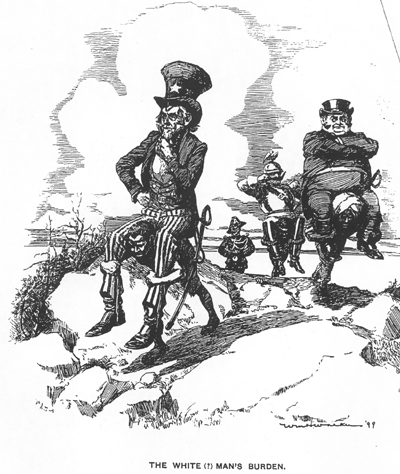Week 24: Imperialism IDs
Justification for Imperialism: The White Man's Burden
Facing condemnation, pro-imperialist persons sought to justify their cause. The conclusions of Charles Darwin were cited in their justifications. It was expected, as proven by the Law of Natural Selection, that some men were better equipped and more likely to survive and prosper than others. Also cited was a commonly held principle of the time: philanthropic duty. Imperialist nations defended their actions by concluding that it was the duty of the fortunate, Christian, advanced nations to help the unfortunate, heathen, ignorant nations of the world. In so concluding, the imperialist nations took up "the white man's burden."
"The White Man's Burden" by Rudyard Kipling (1899)
Take up the White Man's burden--
Send forth the best ye breed--
Go, bind your sons to exile
To serve your captives' need;
To wait, in heavy harness,
On fluttered folk and wild--
Your new-caught sullen peoples,
Half devil and half child.
Take up the White Man's burden--
In patience to abide,
To veil the threat of terror
And check the show of pride;
By open speech and simple,
An hundred times made plain,
To seek another's profit
And work another's gain.
Take up the White Man's burden--
The savage wars of peace--
Fill full the mouth of Famine,
And bid the sickness cease;
And when your goal is nearest
(The end for others sought)
Watch sloth and heathen folly
Bring all your hope to nought.
Take up the White Man's burden--
No iron rule of kings,
But toil of serf and sweeper--
The tale of common things.
The ports ye shall not enter,
The roads ye shall not tread,
Go, make them with your living
And mark them with your dead.
Take up the White Man's burden,
And reap his old reward--
The blame of those ye better
The hate of those ye guard--
The cry of hosts ye humour
(Ah, slowly!) toward the light:--
"Why brought ye us from bondage,
Our loved Egyptian night?"
Take up the White Man's burden--
Ye dare not stoop to less--
Nor call too loud on Freedom
To cloak your weariness.
By all ye will or whisper,
By all ye leave or do,
The silent sullen peoples
Shall weigh your God and you.
Take up the White Man's burden!
Have done with childish days--
The lightly-proffered laurel,
The easy ungrudged praise:
Comes now, to search your manhood
Through all the thankless years,
Cold, edged with dear-bought wisdom,
The judgment of your peers.
The Author
Rudyard Kipling was one of the most popular British authors of the time, though one of the most controversial. He had strong, controversial views on politics and imperialism. However, he was still widely respected and honored, winning the Nobel Prize for Literature. David Kerr once said of Kipling, "He is still an author who can inspire passionate disagreement and his place in literary and cultural history is far from settled. But as the age of the European empires recedes, he is recognized as an incomparable, if controversial, interpreter of how empire was experienced. That, and an increasing recognition of his extraordinary narrative gifts, make him a force to be reckoned with."

This satirical cartoon represents the reality of "the white man's burden." Despite altruistic intentions the imperialist nations, their true motives were selfish, intending to use the natives for monetary gain.
Comments (0)
You don't have permission to comment on this page.